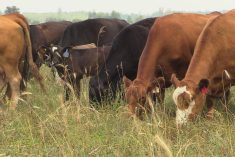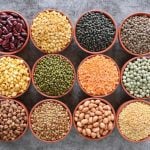Higher grain prices have bit into Maple Leaf Foods’ bakery and hog production businesses, leading the company to break even in its first fiscal quarter.
The Toronto food processing company on Thursday posted a net loss of just $10,000 on $1.2 billion in sales in its quarter ending March 31, down from $10.5 million net income on $1.32 billion in sales in the year-earlier period.
While earnings were up in the company’s processed meat and packaged meals businesses, its bakery margins dropped due to higher wheat prices, and escalating grain prices led to “significant losses” in hog production.
Read Also

U.S. livestock: Cattle regain ground, hogs dip
Chicago cattle futures regained ground on Wednesday after falling off a cliff late last week. Most-active December live cattle contracts…
“These effects, while material, are temporary and are expected to reverse as markets stabilize,” CEO Michael McCain said in a press release, citing a combination of price increases on the company’s products, “some reduction in wheat prices” as new crops come to market and livestock price increases as hog supplies tighten.
“We fully expect these to be difficult but transitory market
conditions,” he said.
Maple Leaf said it’s made “good progress” in shifting its protein operations to a higher-margin value-added meat and meals business model. During Q1, that included the company’s move to double-shift its pork cut operations at Brandon, Man., by September, close its fresh pork processing plant in Winnipeg consolidate its value-added ham boning at another Winnipeg facility.
Maple Leaf also said it’s “preparing” to sell its pork processing plant at Burlington, Ont., and expects it will save on distribution costs later this year once it completes construction once it finishes its new distribution centre in Saskatoon and consolidates its warehousing into two facilities in Western Canada.
As per its 2006 reorganization plan, Maple Leaf also still plans to “significantly reduce” the number of hogs it produces, having marketed 338,000 finished hogs in Q1 compared to 346,000 last year.
Included in the 2008 tally were 108,000 hogs
related to Alberta and Ontario investments that were disposed of in the first quarter, but where Maple Leaf has kept and will grow out the remaining hogs that
were in process at time of sale. Most of those are expected to be sold by the end of July, the company said. Other restructuring of hog production operations in Western Canada is “materially complete.”
Also offsetting Maple Leaf’s costs in its Q1 were $8.4 million in government support payments “received as part
of programs to assist the hog production industry.”
Contract prices cut
Maple Leaf has also recently started asking its contract hog producers to take an average price cut of 22 per cent when their five-year contracts come up for renewal, the Manitoba Co-operator reported in its April 24 issue.
Maple Leaf’s hog management wing, Maple Leaf Agri-Farms (formerly Elite Swine), told the Co-operator that it has to cut the prices paid to its in-house producers in order to compete against U.S. hog farmers.
“It’s really a big currency issue and we’ve been off-side on contracts,” Maple Leaf’s Glen Gratton told reporter Ron Friesen, noting some of the contracts were signed when the Canadian dollar was valued below US70 cents.
“It’s not sustainable and we realize now that for us to keep it sustainable, we’ve got to be in line on a North American basis to be able to compete,” Gratton said.
Producers are being told about the price cut when their contracts come up for renewal, the company said. Agri-Farms, which owns its pigs, provides weanlings and feed to farmers who raise the hogs to slaughter weights in the farmers’ own barns.
Agri-Farms produces about 825,000 hogs per year through 200 contract barns for the company’s Brandon, Man. slaughter plant. The bulk of hogs processed at Brandon are bought on the open market from independent operators.















